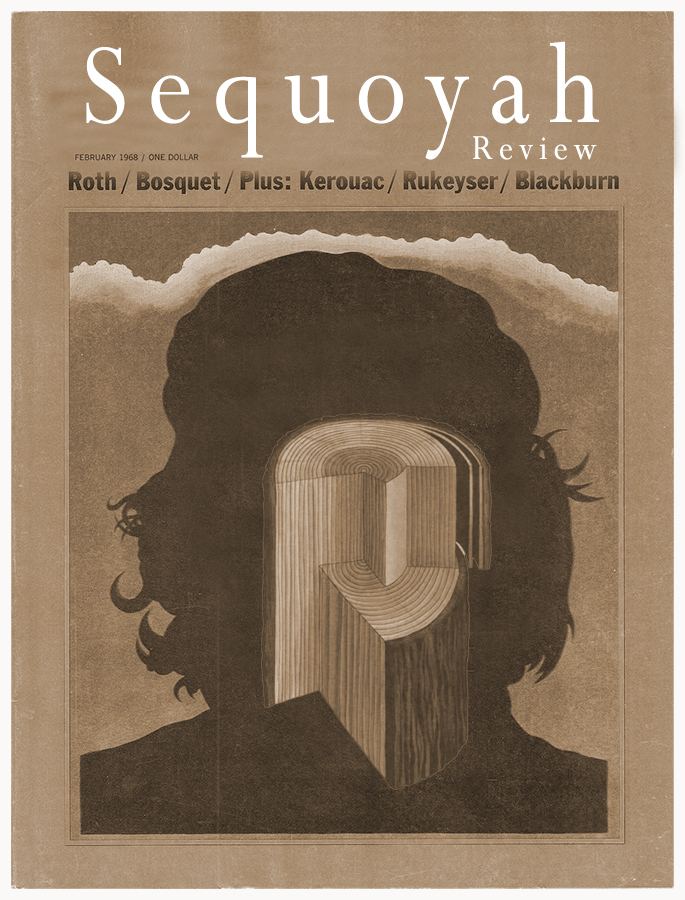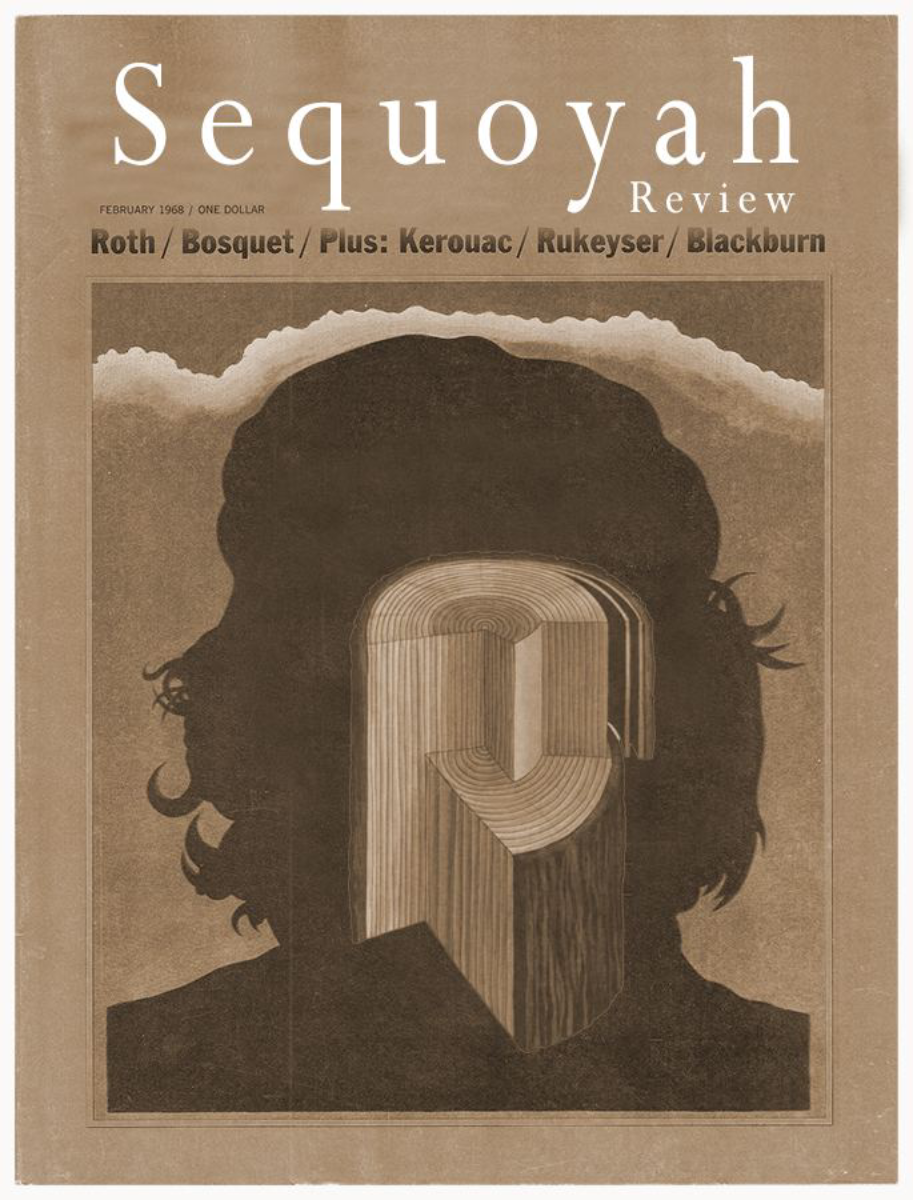A STORIED LITERARY MAGAZINE
FACES A MORAL RECKONING
Nearly twenty years ago, The Sequoyah Review found a home at Southeastern Backwater State University. Between then and now, we’ve taken great pride in publishing exceptional literary writing to an increasingly dwindling, indifferent, distracted, and illiterate audience.
In our early days, we were among the first to publish such luminaries as John Stanley Cooper, Albert Dunley, and L. Ron Hubbard, and bring out a lost story by Amanda McKittrick Ros to great fanfare. We championed E.L. James when no one else would.
We’ve been proud home to Dan Quayle’s ghostwriter Anonymous; to the actual ghost writer Casper the Disgruntled Scribe; the avant-garde simian writing group 12 Monkeys with Typewriters; and the radical infant author Bertha Brecht. And, more recently, David Imposter Wallace (the David Foster Wallace ‘cover writer’), Instapoet Portia Portentous, the AI poembot Poem-a-maticTM, and the non-species identifying The Poetic Entity Formerly Known as Sch/Ism.
However, recent events in the Zeitgeist have made it all but impossible to ignore our linguistic foundation, leading to a difficult reckoning. Not only does the name of our magazine, by its continued presence—along with the extraordinary influence we exert in literary visibility and the cultural sphere—carry the weight of an oppressive and appropriative history, so too does the ignorance, silence, and inaction of our collective all these years.
Our magazine was founded in White City, Oregon in 1962, by celebrated poet Whitey Whitehead. Interestingly, half-brother of organized crime boss Whitey Bulger; MLB manager Whitey Herzog; and Whitey “Whitey” White, leader of notable swing era dance troupe Whitey’s Swingin’ Whiteflies. And who happened to work for years at Midwest confectionary chain Whitey’s Ice Cream, before finding his big artistic break with his second poetry collection, White on White. And briefly was keyboardist for the Whitesville, Louisiana funk band YT. Anyhow, he titled the magazine The Sequoyah Review, after the Cherokee polymath and crusader.
In the intervening years, the magazine traveled to Northwest Southeast University College, Kalamazoo U, Slippery Rock, Greendale Community College, The University of North North North Alaska, The William Zabka School of Karate, and The Handsome Boy Modeling School.
Due to financial strains in the late 70s and 80s, it was run for a time out of a thriving taco truck on the border of El Paso, which sadly turned out to be a drug racketeering front. Surreptitiously out of the basement of Studio 54 in NYC, from which we were unceremoniously ousted by an irate Truman Capote high on Lime Rickeys, Quaaludes, and Darvon. DeVry Technical Institute, where we needed to supplement creative writings with technical blueprints. The Derek Zoolander Center for Children Who Can’t Read Good and Wanna Learn to Do Other Good Stuff Too. And finally finding a fine home and funding at our present supportive location. The rest is history.
However, to the best of our knowledge, throughout our long and storied career, none of these institutions or personages, or any member of our staff, have held any connection whatsoever to Native American or Cherokee heritage, or been racially or culturally entitled to the use of Indigenous language. Maybe that guy in The Village People who’d frequent Studio 54 and dress, err, in a Halloween-like mishmash of stereotypical American Indian garb—but that’s kind of sketchy at best. To wit: our name has always been an egregious act of exploitation.
When our founder titled the magazine after the eponymous Sequoyah, esteemed trader and craftsperson, activist, diplomat, and creator of the Cherokee writing system—whose name actually means “pig’s foot,” referring to a lame leg, one of various hindrances he had to overcome—it was like: ‘What the fuck, man? Do you just think Native American stuff sounds cool, or what? That was pretty far out of left field.’
Hopefully, it was some kind of misguided celebration and symbolic parallel to the magazine’s anticipated accomplishments. A few current editors pointed out it would’ve been more fitting—and far simpler—to choose Sequoyah’s namesake, the majestic and enduring sequoia tree (or redwood), indeed native to Oregon.
As Whitey Whitehead passed away some 25 years ago, in a freak twerking accident, we cannot know precisely his intentions. But we can try to acknowledge our longstanding complicity in imperialist oppression and cultural theft, and—though restitution is impossible—make appropriate and long overdue amends, and indeed penance.
“As Whitey Whitehead passed away some 25 years ago, in a freak twerking accident, we cannot know precisely his intentions.”
To that end, we have already undertaken, and intend to complete, the following measures. In addition to our Masthead undergoing mandatory sensitivity training and historical education, striving for more inclusivity in staffing and publication, and staying abreast of the cultural discourse, after the example of Roman era ascetic Simeon Stylites, we will live and work remotely atop stone pillars of six cubits, exposed to the elements, for the next three years, reflecting upon our ignorance. Hopefully we’ll be able to get WiFi up there.
Our Academic Liaison will be branded with the Purple Letter, and made to stand in penitence and shame outside The US Library of Congress during working hours for a month’s time wearing a sandwich board reading “I Steal Identities.”
Our former Editor, perhaps most culpable in their contemporary awareness of these issues yet unwillingness to address them, will be given a massive dose of 5-MeO DMT—to derange their senses and instill The Fear—and cast into The Maze of Madness for all eternity, lest they find a way to escape. All other former editors and staff, by means of a lottery, will alternately be put in the stocks, pilloried, or given the ducking stool; made to scourge the flesh, sleep on a bed of nails, castrate themselves, gnaw off their own tongue, or blind themselves in self-mortification; be bound in chains and have their liver eaten by an eagle; and meted out likewise fitting punishments.
All former Contributors will summarily be rounded up and placed into makeshift labor camps, if one will, Literary Gulags, where they’ll be forced to assess a neverending stream of bad writing submissions twelve hours a day. Anyone who’s ever read the magazine, or even thought of it, will be forced to act out scenes from Pier Paolo Pasolini’s controversial film Salò: 128 Days of Sodom, as a lesson in suffering.
As for Whitehead himself—we weren’t sure whether to expunge all traces of his existence as the ultimate justice, or erect a condemning monument decrying his ignominy for the ages. So we did both. Wherever we could not erase his record completely, we changed his persona to one ‘Stan the Clown.’ And at once made arrangements with his hometown to install a vivid statue depicting him in this grotesque regalia, accompanied by a denunciatory plaque bearing historical context and an ominous warning in rhyming couplets of a curse upon whoever might follow the same path. However, recently we’ve been made aware of insensitivity to the clown community and are in the process of recasting.
I mean, are we, like, even allowed to write about any of this stuff? Thus, meta-narratively, the very author of this boundary-skirting satire, as soon as it’s completed, will straightway off themselves with a swift and brutal shotgun blast to the head (no laughing matter, but nonetheless), their remains cremated, the ashes cremated again, and thrice for good measure, and dumped into the Dustbin of Comedic History. Unfortunately, though it’s decomposing, whose smells sometimes still reach us, and we might guiltily rifle through in lost moments.
“I mean, are we, like, even allowed to write about any of this stuff?”
We recognize that these are only small steps in interrogating the structures of power and privilege, and atoning for our offenses, and that we must be ever vigilant in continuing to inflict a barrage of horrific retributions, immolations, and extirpations upon ourselves and everyone who ever was or will be involved with the magazine. Which, of course, is the most constructive and very best way to redress wrongs.
Going forward—due to years of conditioning to prevailing new media, social media, clickbait, consumerist brainwashing, postmodern relativism, disinformation, and anti-intellectualism—seeing as even the publishees themselves seem to hardly read the magazine… even their own writings in full… and even when we bestow awards upon them and throw launch parties and ceremonies. And, after all, it being the ‘Golden Age of Streaming & Television’ (likely the last golden age of any kind for humanity). We will be transitioning to a fully online and Metaverse model, and shifting our ‘content’ to primarily bite-sized movie and TV show synopses and reviews, written by promising up-and-coming Bots generating literary buzz.
And, as for our new name—we are currently choosing between The Generic Inoffensive Anodyne Quarterly and The Super Racist Review. Both garnering about equal support so far.
We are deeply excited about these seminal changes, and look forward to shepherding a new generation of groundbreaking, visionary authors, such as Bleep Bloop Beep, SnapGhost, and I Am Not A Robot. The future has never looked so bright for The Anodyne Quarterly, the state of literature, and humanity at large!
The Editors,
Bleep Bloop Bleep
SnapGhost
I Am Not A Robot
Skynet
Rehoboam
THE TRUST







Be First to Comment